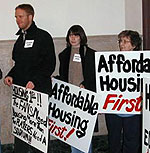Stadium task force finishes work with recommendation for two stadiums
By Michael Khoo
Minnesota Public Radio
January 29, 2002
A tripartisan stadium task force has given final approval to a report that calls for two new professional sports stadiums. The panel voted 16-1 to recommend a new ballpark for the Minnesota Twins and a second stadium to house the Vikings and the University of Minnesota football team. The task force will now forwards its findings to the Legislature where stadium legislation could still face a tough fight.
| |
|
|
|
||
The task force report offers a wide menu of options to finance the two stadiums; everything from straight user fees such as ticket and concession taxes to more general revenues such as a metro-wide car rental surcharge and possible gambling revenues.
Rep. Tom Osthoff, DFL-St. Paul told members he'd had a change of heart over the past few months. "I came into this meeting saying I don't think I'll ever vote for two stadiums in one year. But I'll tell you, you've given me some options and some thoughts to do about it. It's doable, much to my surprise. Do we have the votes for it? That's another day's fight," he said.
But the panel made no specific recommendations about how to stitch the various revenue streams into an acceptable compromise, one on which the Republican-controlled House, the Democratic-controlled Senate, and Gov. Jesse Ventura could agree.
The task force also declined to set limits on how much money the state might contribute to the projects through state-issued bonds.
Rep. Mary Liz Holberg, R-Lakeville, the lone opposing vote, said the funding might add up, but not all of the options were necessarily palatable to everyone.
"Certainly we can get there, we can load every wonderful sounding thing up and have a really pretty Christmas tree. But the fact is, in order to get it off the floor of the House and/or Senate with that wide of a range of funding streams may be problematic," she said.
Even so, representatives of the Vikings and the Twins were clearly pleased with the task force's work. Kevin Cattoor, chief operating officer for the Twins, says the strong 16-1 vote adds new momentum to a debate that has so far left the team out in the cold.
"Had it been anything like a 10-8, I think there would have been still a lot of confusion about the issue. But I don't think there is. I think there's a definitive action here to resolve the issue. And then that will obviously go into the hands of our Legislature and the governor to address the issue this session," Cattoor said.
Opponents of public participation in a stadium deal, however, say they're not ready to give up the fight. There are already rumblings that certain funding options - gambling money or the car rental tax - are too broad to qualify as user fees. And the task force's final meeting drew some demonstrators who have been noticeably absent during other hearings.
Dan McGrath, executive director of Progressive Minnesota, the same group that successfully fought St. Paul's 1999 stadium campaign and passed a strict limit on the amount of city dollars Minneapolis can contribute to professional sports facilities, says Progressive Minnesota will monitor the stadium debate as it now moves to the full Legislature.
"When you're looking at public funding and you're looking at public financing, the fact of the matter is is those are dollars that can still be put towards issues that are of much greater concern to people all over the state. So it doesn't make a lot of sense to be worrying about how we're going to fund a stadium when we're not worrying about how we're trying to fund housing," he said.
In recognition of those concerns, the task force adopted language specifically noting the stadium issue was only one among many important priorities facing lawmakers.
More from MPRMore Information

